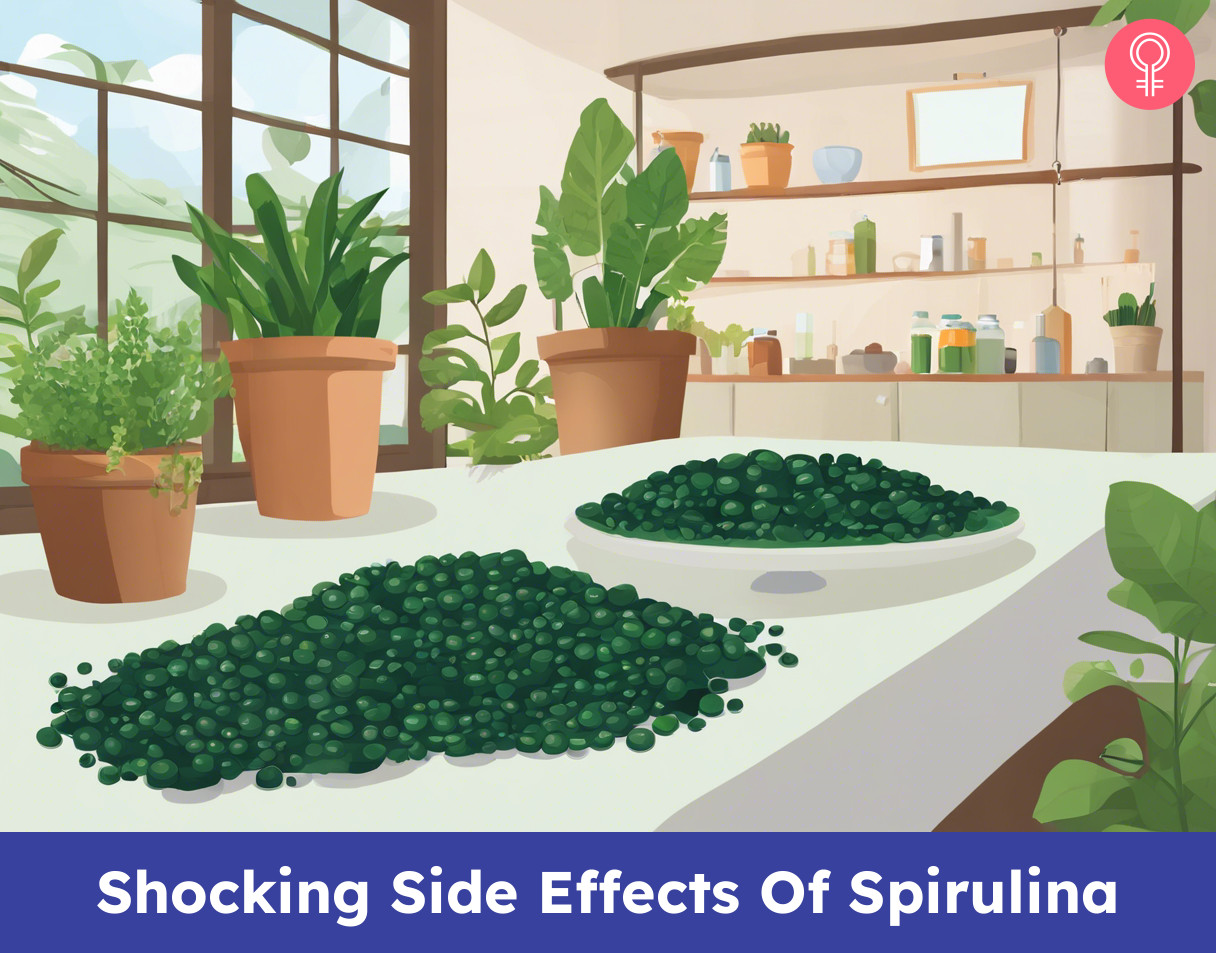Spirulina, the free-flowing microalgae that grow in water bodies, is a rich resource of nutrients and has been consumed in Central Africa for centuries . However, right here's the big inquiry-- are there any type of adverse effects of spirulina?
Spirulina is taken in orally and is offered in flake, powder, or tablet type. The powder and flakes are likewise normally blended in shakes and fruit juices.
Know The Flip Side: Spirulina
Short-Term Effects
Digestive system discomforts such as unwanted gas, nausea, stomach aches, and stomach concerns such as acid indigestion.
Long-Term Effects
Excessive consumption might intensify signs of autoimmune illness like bronchial asthma and anemia as well as cause steel poisoning.
Drug Interactions
May interfere with drugs such as immunosuppressants.
When To See A Doctor
If you create extreme tummy pain, yellowness in the eyes, or experience relentless throwing up, look for clinical assistance quickly.
This healthy and balanced food can, as a matter of fact, be dangerous to your health if not consumed in regulated quantities. This write-up checks out the nine shocking damaging results of excess spirulina intake. Take a look!
Did You Know?Until the 16th century, Mesoamericans and Aztecs consumed spirulina as food. It was obtained from Mexico's Lake Texcoco and was likewise sold to the soldiers in the type of cakes called 'tecuitlatl'.
In This Article
What Is Spirulina?
Spirulina is a nutrient-rich green alga with a microscopic spiral form. It is taken into consideration a superfood because of its remarkable dietary material. It is high in protein and offers all necessary amino acids, making it a superb plant-based protein source. Spirulina likewise contains necessary vitamins, including B12, and minerals like iron and magnesium. It's rich in anti-oxidants, especially phycocyanin, that may deal with oxidative anxiety and swelling. Some believe that it also enhances the immune system, assists with allergic reactions, and aids detoxification due to its chlorophyll web content. However, it has a solid taste that may not suit everybody and you must consult a healthcare expert before including it to your diet plan to prevent any kind of possible adverse effects.
What Are The Potential Side Effects Of Spirulina?
1. Worsens Phenylketonuria
Phenylketonuria is a genetically acquired condition in which the client can not metabolize the amino acid called phenylalanine due to the lack of an enzyme called phenylalanine hydroxylase.
The individual shows signs and symptoms like delayed development, convulsions, hyperactivity, and analytical impairment. However, spirulina is a rich resource of phenylalanine.
Consuming spirulina aggravates the symptoms of phenylketonuria.
2. Exacerbates The Symptoms Of Autoimmune Diseases

An autoimmune disease creates when the immune system strikes the healthy tissues in your body, causing organ damage and inflammation.
Arthritis, asthma, periodontitis i X A common yet severe gum infection that, if left neglected, may result in the loss of teeth and damages to the jaw bone., vitiligo, kind 2 diabetic issues, multiple sclerosis i X A persistent problem that harms the protective covering of the nerve fibers, interfering with interaction between the mind and the body parts., psoriasis, and destructive anemia i X An autoimmune condition where the body can not soak up vitamin B12, bring about a decrease in red blood cells. are a couple of examples of autoimmune conditions.
Spirulina is, besides, an international body. When you eat it, the body overreacts and magnifies the task of the body immune system. This worsens the signs of a pre-existing disease or triggers extreme swelling ( 1 ).
3. Interferes With Drug Action

Spirulina is an irritant to your body immune system. It can interfere with medicines, specifically immunosuppressants i X A team of medicines or agents that can suppress the body's immune system and slow down immune responses.
A person on immunosuppressant medication must not consume spirulina. Else, it will certainly decrease the effect of the medicine, leading to severe difficulties.
4. Risk Of Heavy Metal Toxicity
Specific ranges of spirulina that are created under unrestrained setups are usually infested with significant traces of hefty metals, such as mercury, cadmium, arsenic, and lead.
Long term consumption of spirulina that comes from such undependable sources results in damage to your vital body organs, such as the kidneys and liver.
Compared to adults, youngsters are at a higher risk of establishing fatal complications due to heavy metal poisoning from infected spirulina.
Ensure to inspect where your spirulina is sourced from.
5. Renal Disorders
Our body creates a considerable amount of ammonia as it metabolizes the healthy protein in spirulina, which obtains exchanged urea.
This places extreme stress on the kidneys to clear out such a large quantity of urea from the blood, ultimately leading to lowered efficiency of the kidneys and even renal failure.
Some people have a tendency to develop kidney stones because of such high focus of urea in the renal system.
6. Triggers Edema And Body Weight Fluctuation

Spirulina is packed with vitamins, healthy proteins, and minerals. Individuals with compromised kidney function would certainly be unable to remove the unnecessary parts from their blood stream.
One of the most abundant minerals discovered in spirulina is iodine. While on the one hand, it is excellent to take in iodine by means of spirulina, on the other hand, it can influence your thyroid and parathyroid glands. The impacts are much more obvious in individuals with hyperparathyroidism i X A condition where the body has raised parathyroid hormone degrees, causing high calcium degrees in the blood, which influences bone health.
The accumulation of extreme nutrients, in addition to iodine, in the blood results in liquid retention (edema) in your arm or legs, imbalance in calcium, phosphate, and iodine absorption, and abrupt weight gain or loss, lethargy, and heart diseases.
7. Digestive Discomfort And Nausea

Consuming spirulina can result in flatulence, triggering stomach discomfort, pains, nausea or vomiting, and anaphylaxis i X Quick and persistent allergic reactions triggered by an allergen. It needs punctual medical care as it is dangerous.-- specifically in individuals eating it for the first time ( 2 ).
Spirulina varieties plagued with contaminants, such as microcystins (toxic substances created by turquoise algae), also give rise to serious gastric conditions like severe dehydration and acid indigestion.
Related: 13 Effective Home Remedies To Stop Vomiting And Nausea
8. Could Cause Anxiety And Motor Neuron Disease (MND)
Spirulina gathered from the unrestrained wild sources, such as lakes, fish ponds, and cluttered seas, have harmful pressures.
Such morphologically similar turquoise algae generate neurotoxic chemicals like β-methylamino-L-alanine, or BMAA, which might create extreme neurodegenerative problems like motor neuron condition (MND), amyotrophic side sclerosis (ALS), Alzheimer's, Parkinson's, mental deterioration, anxiety, and sleep deprived evenings (insomnia) complied with by headaches and lightheadedness ( 3 ).
Related: 6 Tryptophan-Rich Food Groups For Poor Sleep & Anxiety Issues
9. Risk For Pregnant And Breastfeeding Women

The safety and security of spirulina for pregnant and nursing women is not well discovered. Therefore, it is recommended that expectant or nursing ladies stay clear of taking spirulina or stay under stringent medical monitoring while doing so.
Infants and kids must be kept away from such supplements because they quickly develop allergic reactions, skin rashes and fatal cross-reactions.
Paul Creek, a blog owner, shares the funny and undesirable experience of trying spirulina, explaining its slimed structure, putrid preference, and explosive response, eventually deciding to desert it due to its nauseous nature. He creates, "On contact with my mouth, the powder appeared to expand and fill my mouth, so I might hardly breathe ( i ).”
Related: Best Foods To Increase Breast Milk Supply
Quick TipSpirulina contaminated with cyanotoxins might prove to be a significant wellness threat as these compounds work as powerful neurotoxins ( 4 ).
In Short…
Though algae like spirulina are very advantageous to our body, having it in the appropriate dose matters.
Not just the dose, however the resource where you get such supplements also has a considerable result on your health and wellness. It is essential to know
- the biochemical composition (co-existing microbes)
- what kind of exhaust gets into these waters
- whether the effluents are treated before discharge
- the health of the local community
- just how the QC (quality control) of the source waterbody is done
To reap the maximum benefits from an exceptional nutritious supplement like spirulina, you need to ask about such information to avoid the lethal side effects noted right here.
Keep in mind constantly to maintain your doctor notified about the dosage and the method your body responds to spirulina. In instance you notice any of the signs and symptoms we have actually gone over, avoid taking spirulina and see your medical professional right away.
Infographic: How To Deal With Side Effects Of Spirulina
Spirulina has acquired the attention of several healthcare lovers as a supplement loaded with several helpful nutrients. It is consumed in several forms and offers various health and wellness benefits. Nonetheless, it does create adverse effects also. However the good news is you can handle them. The following infographic talks about just how you can deal with the negative effects of spirulina. Inspect it out.
Illustration: StyleCraze Design Team
Get the high-quality PDF version of this infographic.


Share
Spirulina is a healthy nutritional supplement currently getting popularity. However, if the dosage isn't ideal and the supplement resource isn't regulated or licensed, or if it contains pollutants, then spirulina may trigger adverse effects. The negative effects of spirulina might vary from intensifying autoimmune problems to creating nausea or vomiting and abdominal discomfort. It may additionally aggravate medical conditions such as phenylketonuria, renal issues, or neurological disorders. In some cases, spirulina can create allergic reactions or hinder the performance of particular immunosuppressant medications. Restricting or avoiding its consumption can assist prevent these difficulties.
Did you locate this article useful and helpful? Please share your remarks, comments, and ideas in package listed below.
Share this article and spread the word!
Frequently Asked Questions
Is spirulina the same as chlorella?
Eva De Angelis , Dietitian Nutritional expert, claims, "No. While both are prominent supplements, they are different types of algae. Spirulina, for instance, is a saltwater blueish-green algae with high calcium, iron, copper, and healthy protein material. Chlorella, on the other hand, is a freshwater eco-friendly algae that are higher in omega-3 fats, vitamin A, magnesium, and zinc. Both include high antioxidants, which may benefit heart and mind wellness."
What medications should not be taken with spirulina?
According to De Angelis, "Spirulina might communicate with immune-suppressing drugs. Yet, there is still not enough proof regarding the certain communications and their seriousness."
Can spirulina affect hormones?
"As spirulina is an outstanding supplement for liver feature, it can help with hormone metabolism, particularly in women. It's additionally high in hormone-balancing nutrients like calcium, magnesium, and potassium," claims De Angelis.
Is spirulina safe to take every day?
Yes, it is risk-free to take spirulina every day. However, 5- 8 grams is considered to be a risk-free everyday dose. If eaten in high quantities, it may create some negative effects.
Can spirulina cause liver damage?
Consuming spirulina in minimal quantities might not create any liver damages. Nonetheless, if consumed in high amounts, it may adversely affect your liver health and wellness.
How many times a day should you take spirulina?
Spirulina can be taken 2 to 3 times a day. However, the overall dosage must not surpass 8 grams.
Does spirulina make you poop?
Spirulina has cleansing residential properties that can efficiently remove gathered waste items from the colon. Thus, it might make you poop.
Can spirulina make you put on weight?
No, spirulina does not create weight gain as it is extremely low in calories. A tbsp of dried spirulina has only 20 calories.
Key Takeaways
- Spirulina is a microalgae that can have serious adverse effects with signs and symptoms including itching and swelling.
- It can trigger digestive troubles, such as bloating and cramps and can get worse pre-existing thyroid problems.
- It typically causes heavy steel poisoning as it is normally polluted.
- This microalgae suppresses the immune system.



